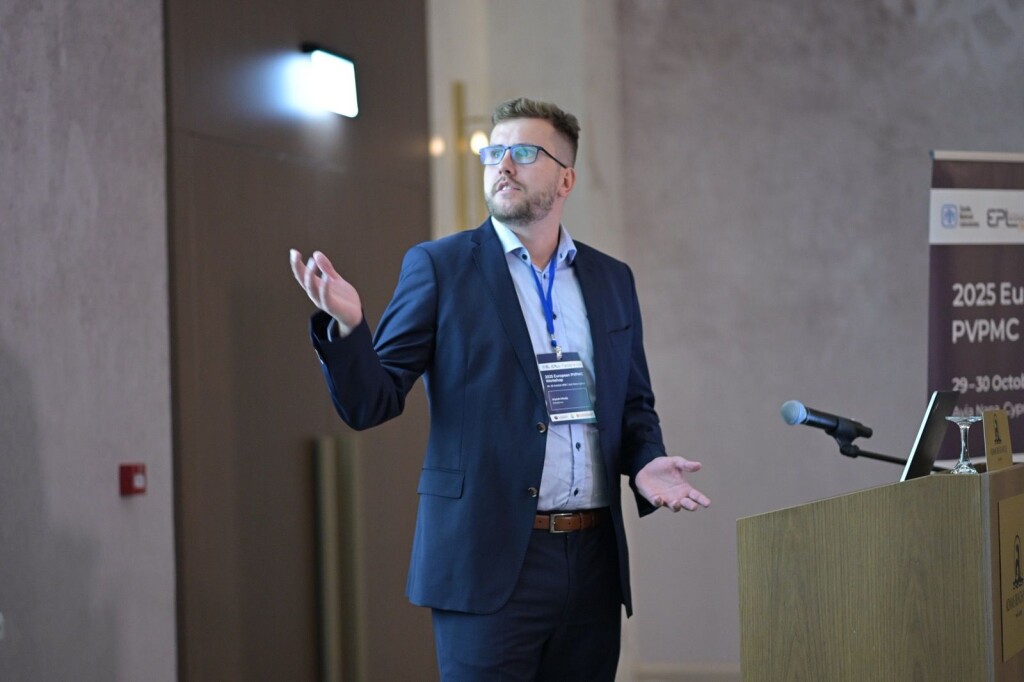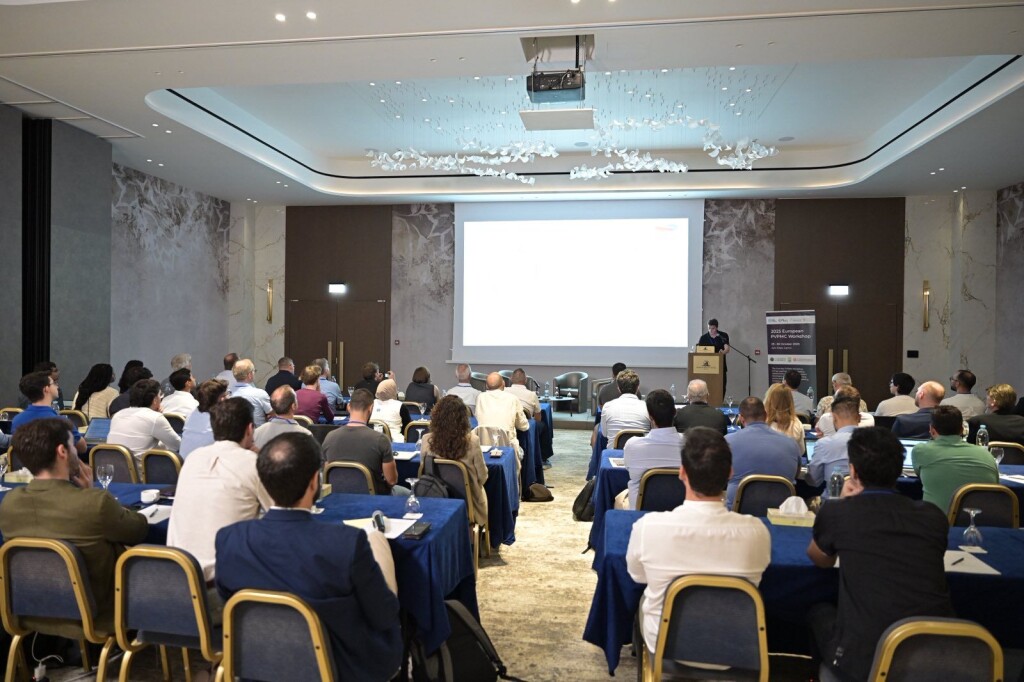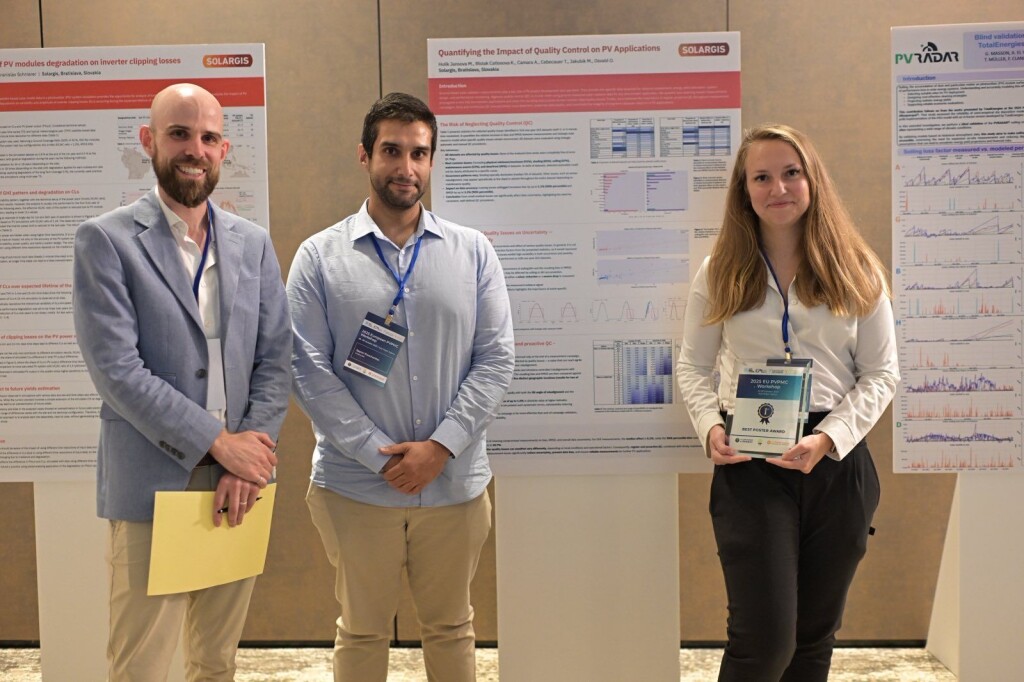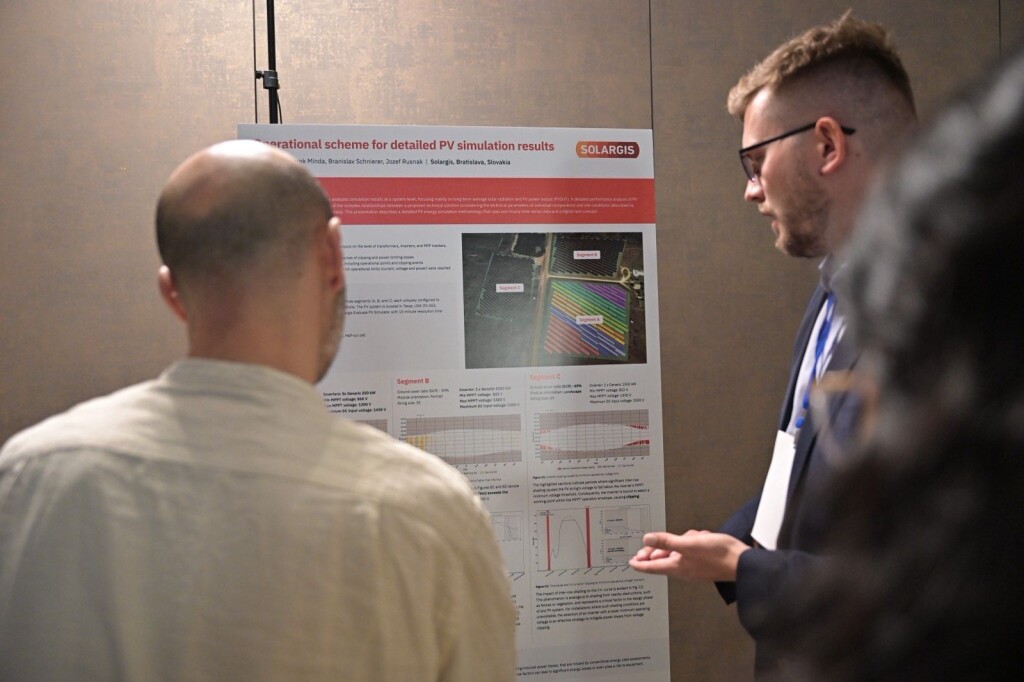本页未翻译。您正在浏览的是英文版本。
The Solargis team recently joined the Photovoltaic Performance Modeling Collaborative (PVPMC) 2025 Workshop, held on 29–30 October in Ayia Napa, Cyprus. This year’s event brought together leading experts in PV performance modeling, system analytics, and solar energy integration, with a special focus on the challenges and solutions of island grids.
Solargis was represented by our data and modeling experts, who contributed both to the technical sessions and the poster exhibition.
In Session #1: PV Performance Modeling, our expert on PV simulation Marek Minda presented “Scalable Simulation of Complex PV Energy Systems Using Smart Ray Tracing,” contributing to discussions on advanced simulation methods for complex system design and validation.

Marek Minda, Solargis' PV simulation expert, presents on day one at PVPMC 2025.
His talk explored how ray-tracing techniques can be scaled for complex PV system design and validation, showcasing methods that improve the accuracy and efficiency of energy yield simulations.
The session concluded with a lively discussion among participants on practical applications, modeling challenges, and the future of PV system analytics. The exchange reinforced how data-driven modeling continues to be a key driver in optimizing performance and system design.

The 2025 PVPMC Workshop brought together leading experts in PV performance modeling and system monitoring for three days of knowledge-sharing, collaboration, and innovation.
The Poster Session at the 2025 PVPMC Workshop showcased cutting-edge research and innovation from across the global PV performance modeling community. Participants shared insights spanning data analytics, system design, and performance optimization – reflecting the depth and diversity of today’s PV research landscape.
Our researchers presented three scientific posters covering core areas of our R&D and reflecting our ongoing work on solar data quality, uncertainty reduction, and performance modeling best practices.
We are honored that one of our posters, “Quantifying the Impact of Quality Control on PV Applications” was recognized with the Best Poster Award at PVPMC 2025.

Our team was awarded with the Best Poster Award for one of our scientific posters on "Quantifying the Impact of Quality Control on PV Applications"

At the workshop, Solargis researchers presented three scientific posters.
Below, you can review all three of our posters.
Authors: M. H. Jansova, K. Blstak Catlosova, A. Camara, T. Cebecauer, M. Jakubik, O. Osvald
This study quantifies how retaining compromised data impacts bias, RMSD, and overall uncertainty — with effects ranging from negligible to bias over 1.3% and RMSD 3.2%.depending on the quality issue. The research underscores the importance of regular, proactive quality control (QC) and continuous instrument maintenance to ensure reliable, bankable data for PV applications.
Authors: Michal Jun, Marek Minda, Branislav Schnierer, Jozef Rusnak
This paper shows how sub-hourly simulations and a digital twin approach can reveal operational scenarios that conventional long-term averages miss, such as voltage limit breaches or shading-induced losses. It highlights the need to account for dynamic climate conditions and site-specific configurations in PV design to prevent energy loss and equipment stress.
Authors: Jozef Rusnak, Branislav Schnierer
Using long-term, sub-hourly solar model data, this study analyzed how module degradation affects inverter clipping losses (CLs) over a plant’s lifetime. Results show that time-step resolution and degradation modeling can affect energy yield by more than 3% in some cases. The research highlights that integrating degradation directly into time-series simulations provides more accurate predictions than post-processing methods.
The Photovoltaic Performance Modeling Collaborative (PVPMC) Workshop is co-hosted by EPL Technology Frontiers Ltd, the Phaethon Centre of Excellence at the University of Cyprus, and Sandia National Laboratories. The event covers PV performance modeling, data analytics, system design, and integration challenges, with an emphasis on advancing accuracy and reliability across the solar industry.
The PVPMC Workshop continues to be one of the most important international forums bridging scientific research and practical applications in the PV industry. The 2025 edition once again highlighted the importance of data quality, simulation scalability, and interdisciplinary collaboration in the pursuit of more reliable, efficient, and predictive PV modeling.
We thank the organizers, co-hosts, and fellow participants for an inspiring exchange of ideas and knowledge sharing.